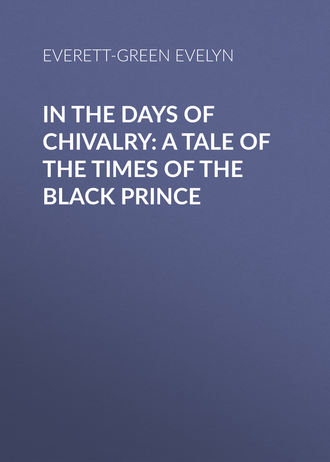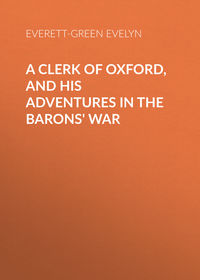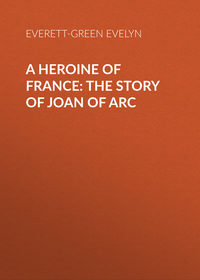 полная версия
полная версияIn the Days of Chivalry: A Tale of the Times of the Black Prince
The fighting was over now. The robbers had had enough of it. Some few had escaped, or had sought to do so; but by far the greater number lay dead on or about the rocky platform, where the fiercest of the fighting had been. They had slain each other as well as having been slain by the Prince's band, and the place was now a veritable shambles, at which some of the lads began to look with shuddering horror.
Several of their own number were badly hurt. Three lay dead and cold. Victory had indeed been theirs, but something of the sense of triumph was dashed as they bore away the bodies of their comrades and looked upon the terrible traces of the fray.
But the Prince had escaped unscathed – that was the point of paramount importance in the minds of many – and he was now engrossed in striving to relieve the sufferings of his wounded comrades by seeing their wounds skilfully bound up by the huntsmen, and obtaining for them draughts of clear cold water from a spring that bubbled up within the cavern itself.
Gaston and Raymond had escaped with minor hurts; but John's case was plainly serious, and the flow of blood had been very great before any help could reach him. He was quite unconscious, and looked like death as he lay on the floor of the cave; and after fruitless efforts to revive him, the Prince commanded a rude litter to be made wherein he might be transported to the Palace by the huntsmen who had not taken part in the struggle, and were therefore least weary. The horses were not very far away, and the rest of the wounded and the rescued captives could make shift to walk that far, and afterwards gain the Palace by the help of their sturdy steeds.
Thus it came about that Master Bernard de Brocas, who had believed the Prince and his party to be engaged in the harmless and (to them) safe sport of tracking and hunting a boar in the forest, was astounded beyond all power of speech by seeing a battered and ghastly procession enter the courtyard two hours before dusk, bearing in their midst a litter upon which lay the apparently inanimate form of his eldest nephew, his brother's first-born and heir.
CHAPTER VII. THE RECTOR'S HOUSE
"It was well thought and boldly executed, my son," said the King of England, as he looked with fatherly pride at his bright-faced boy. "Thou wilt win thy spurs ere long, I doubt not, an thou goest on thus. But it must be an exploit more worthy thy race and state that shall win thee the knighthood which thou dost rightly covet. England's Prince must be knighted upon some glorious battlefield – upon a day of victory that I trow will come ere long for thee and me. And now to thy mother, boy, and ask her pardon for the fright thou madest her to suffer, when thy sisters betrayed to her the wild chase upon which thou and thy boy comrades were bent. Well was it for all that our trusty huntsmen were with you, else might England be mourning sore this day for a life cut off ere it had seen its first youthful prime. Yet, boy, I have not heart to chide thee; all I ask is that when thou art bent on some quest of glory or peril another time, thou wilt tell thy father first. Trust him not to say thee nay; it is his wish that thou shouldst prove a worthy scion of thy house. He will never stand in thy path if thy purpose be right and wise."
The Prince accepted this paternal admonition with all becoming grace and humility, and bent his knee before his mother, to be raised and warmly embraced both by her and the little princesses, who had come in all haste to the Palace of Guildford before the good Rector had had time to send a message of warning to the King. Queen Philippa had heard from her daughters of the proposed escapade on the part of the little band surrounding the Prince, and the fear lest the bold boy might expose himself to real peril had induced the royal family to hasten to Guildford only two days after the Prince had gone thither. They had met a messenger from Master Bernard as they had neared the Palace, and the King, after assuring himself of the safety of his son, made kindly inquiries after those of his companions who had been with him on his somewhat foolhardy adventure.
John de Brocas was lying dangerously ill in one of the apartments of the Palace. The King was greatly concerned at hearing how severely he had been hurt; and when the story came to be told more in its details, and it appeared that to John's fidelity and the stanch support of Audley's two youthful esquires the heir of England owed his life, Edward and his Queen both paid a visit to the room where the sick youth lay, and with their own hands bestowed liberal rewards upon the twin brothers, who had stood beside the Prince in the stress of the fight, and had both received minor hurts in shielding him.
Sir James Audley was himself in the King's train; but he was about to leave the south for a secret mission in Scotland, entrusted to him by his sovereign. He was going to travel rapidly and without any large escort, and for the present he had no further need for the services of the Gascon twins. Neither of the lads would be fit for the saddle for more than a week to come, and they had already made good use of their time in England, and had interested both the King and the Prince in them, and had also earned liberal rewards. In their heart of hearts they were anxious to remain in the neighbourhood of Guildford, for they knew that there they were not far from Basildene. Wherefore when they understood that their master had no present occasion for any further service from them, they were not a little excited and pleased by the thought that they were now in a position to prosecute their own quest in such manner as seemed best to them.
They had made a wonderfully good beginning to their life of adventure. They had won the favour not only of their own kinsfolk, but of the King and the Prince. They had money and clothes and arms. They had the prospect of service with Sir James in the future, when he should have returned from his mission and require a larger train. Everything seemed to be falling in with their own desires; and it was with faces of eager satisfaction that they turned to each other when the knight had left them alone again, after a visit to the long rush-carpeted room, by the glowing hearth of which they were sitting when he had come to seek them soon after the King had visited John's couch.
John lay in a semi-conscious state upon the tall canopied bed, beneath a heavy pall of velvet, that gave a funereal aspect to the whole room. He had been aroused by the King's visit, and had spoken a few words in reply to the kind ones addressed to him; but afterwards he had sunk back into the lethargy of extreme weakness, and the brothers were to all intents and purposes alone in the long dormitory they had shared with John, and with two more comrades who had also received slight hurts, but who had now been summoned to attend the Prince on the return journey to Windsor, which was to be taken leisurely and by short stages.
Oliver and Bernard de Brocas had likewise gone, and John was, they knew, to be moved as soon as possible to Master Bernard's rectory, not far away. The kindly priest had said something about taking the brothers there also till they were quite healed of their wounds and bruises, and John invariably asked for Raymond if ever he awoke to consciousness. What was to be the end of it all the twins had no idea, but it certainly seemed as though for the present they were to be the guests of their own uncle, who knew nothing of the tie that existed betwixt them.
"Shall we say aught to him, Gaston?" asked Raymond, in a low whisper, as the pair sat over the glowing fire together. "He is a good man and a kind one, and perchance if he knew us for kinsmen he might – "
"Might be kinder than before?" questioned Gaston, with a proud smile. "Is it that thou wouldst say, brother? Ay, it is possible, but it is also likely enough that he would at once look coldly and harshly upon us. Raymond, I have learned many lessons since we left our peaceful home, and one of these is that men love not unsuccess. It is the prosperous, the favoured of fortune, upon whom the smiles of the great are bent. Perchance it was because he succeeded not well that by his own brothers our father was passed by. Raymond, I have seen likewise this – if our kinsmen are kind, they are also proud. They have won kingly favour, kingly rewards; all men speak well of them; they are placed high in the land. Doubtless they could help us if they would; but are we to come suing humbly to them for favours, when they would scarce listen to our father when he lived? Shall we run into the peril of having their smiles turned to frowns by striving to claim kinship with them, when perchance they would spurn us from their doors? And if in days to come we rise to fame and fortune, as by good hap we may, shall we put it in their power to say that it is to their favour we owe it all? No – a thousand times no! I will carve out mine own fortune with mine own good sword and mine own strong arm. I will be beholden to none for that which some day I will call mine own. The King himself has said that I shall make a valiant knight. I have fought by the Prince's side once; I trow that in days to come I shall do the like again. When my knighthood's spurs are won, then perchance I will to mine uncle and say to him, 'Sire, I am thy brother Arnald's son – thine own nephew;' but not till then will I divulge the secret. Sir John de Brocas – no, nor Master Bernard either – shall never say that they have made Sir Gaston's fortune for him!"
The lad's eyes flashed fire; the haughty look upon his face was not unlike the one sometimes to be seen upon that of the King's Master of the Horse.
Raymond listened with a smile to these bold words, and then said quietly:
"Perhaps thou art right, Gaston; but I trust thou bearest no ill will towards our two uncles?"
Gaston's face cleared, and he smiled frankly enough.
"Nay, Brother, none in the world. It is only as I think sometimes of the story of our parents' wrongs that my hot blood seems to rise against them. They have been kind to us. I trow we need not fear to take such kindness as may be offered to us as strangers; but to come as suppliant kinsmen, humble and unknown, I neither can nor will. Let us keep our secret; let us carve out our own fortunes. A day shall come when we may stand forth before all the world as of the old line of De Brocas, but first we will win for ourselves the welcome we would fain receive."
"Ay, and we will seek our lost inheritance of Basildene," added Raymond. "That shall be our next quest, Gaston. I would fain look upon our mother's home. Methinks it lies not many miles from here."
"I misdoubt me if Basildene be aught of great moment," said Gaston, shaking back his curly hair. "Like enough it is but a Manor such as we have seen by the score as we have ridden through this land. It may be no such proud inheritance when we do find it, Raymond. It is of our lost possessions in Gascony that I chiefly think. What can any English house, of which even here scarce any man has heard, be as compared with our vast forest lands of Gascony – our Castle of Saut – of Orthez – where the false Sieur de Navailles rules with the rod of iron? It is there that I would be; it is there that I would rule. When the Roy Outremer wages war with the French King, and I fight beneath his banner and win his favour, as I will do ere many years have passed, and when he calls me to receive my rewards at his kingly hands, then will I tell him of yon false and cruel tyrant there, and how our people groan beneath his harsh rule. I will ask but his leave to win mine own again, and then I will ride forth with my own knights in my train, and there shall be once again a lord of the old race ruling at Saut, and the tyrant usurper shall be brought to the very dust!"
"Ay," answered Raymond, with a smile that made his face look older for the moment than that of his twin brother, "thou, Gaston, shalt reign in Saut, and I will try to win and to reign at Basildene, content with the smaller inheritance. Methinks the quiet English Manor will suit me well. By thy side for a while will I fight, too, winning, if it may be, my spurs of knighthood likewise; but when the days of fighting be past, I would fain find a quiet haven in this fair land – in the very place where our mother longed to end her days."
It may be seen, from the foregoing fragment of talk, that already the twin brothers were developing in different directions. So long as they had lived in the quiet of the humble home, they had scarce known a thought or aspiration not shared alike by both; but the experiences of the past months had left a mark upon them, and the mark was not altogether the same in the case of each. They had shared all adventures, all perils, all amusements; their hearts were as much bound up as ever one with the other; but they were already looking at life differently, forming a different ideal of the future. The soldier spirit was coming out with greater intensity in one nature than in the other. Gaston had no ambition, no interest beyond that of winning fame and glory by the sword. Raymond was just beginning to see that there were other aims and interests in life, and to feel that there might even come a day when these other interests should prove more to him than any laurels of battle.
In the days that followed, this feeling grew more and more upon him. His hurt was more slow to heal than Gaston's, and long after his brother was riding out daily into the forest with the keepers to slay a fat buck for the prelate's table or fly a falcon for practice or sport, Raymond remained within the house, generally the companion of the studious John; and as the latter grew strong enough to talk, he was always imparting new ideas to the untutored but receptive mind of the Gascon boy.
They had quickly removed from the Royal Palace to the more cozy and comfortable quarters within the Rectory, which belonged to Master Bernard in right of his office. John was as much at home in his uncle's house as in his father's, having spent much of his youth with the priest. Indeed it may be questioned whether he felt as much at ease anywhere as he did in this sheltered and retired place, and Raymond began to feel the subtle charm of the life there almost at once.
The Rector possessed what was for that age a fine collection of books. These were of course all manuscripts, and very costly of their kind, some being beautifully illuminated and others very lengthy. These manuscripts and books were well known to John, who had read the majority of them, and was never weary of reading them again and again. Some were writings of the ancient fathers; others were the works of pagan writers and philosophers who had lived in the dark ages of the world's history, yet who had had thoughts and aspirations in advance of their day, and who had striven without the light of Christianity to construct a code of morals that should do the work for humanity which never could have been done till the Light came into the world with the Incarnation.
As Raymond sat day by day beside John's couch, hearing him read out of these wonderful books, learning himself to read also with a sense of quickened pleasure that it was a surprise to experience, he began to realize that there was a world around and about him of which he had had no conception hitherto, to feel his mental horizon widening, and to see that life held weightier questions than any that could be settled at the sword's point.
"In truth I have long held that myself," answered John, to whom some such remark had been made; and upon the pale face of the student there shone a light which Raymond had seen there before, and marked with a dim sense of awe. "We hear men talk of the days of chivalry, and mourn because they seem to be passing away. Yet methinks there may be a holier and a higher form of chivalry than the world has yet seen that may rise upon the ashes of what has gone before, and lead men to higher and better things. Raymond, I would that I might live to see such a day – a day when battle and bloodshed should be no longer men's favourite pastime, but when they should come to feel as our Blessed Lord has bidden us feel, brothers in love, for that we love Him, and that we walk forward hand in hand towards the light, warring no more with our brethren of the faith, but only with such things as are contrary to His Word, and are hindering His purpose concerning the earth."
Raymond listened with but small comprehension to a thought so vastly in advance of the spirit of the day; but despite his lack of true understanding, he felt a quick thrill of sympathy as he looked into John's luminous eyes, and he spoke with reverence in his tone even though his words seemed to dissent from those of his companion.
"Nay, but how would the world go on without wars and gallant feats of arms? And sure in a good cause men must fight with all their might and main? Truly I would gladly seek for paynim and pagan foes if they might be found; but men go not to the Holy Land as once they did. There be foes nigher at home against whom we have to turn our arms. Good John, thou surely dost not call it a wicked thing to fight beneath the banner of our noble King when he goes forth upon his wars?"
John smiled one of those thoughtful, flickering smiles that puzzled his companion and aroused his speculative curiosity.
"Nay, Raymond," he answered, speaking slowly, as though it were no easy matter to put his thought in such words as would be comprehensible to his companion, "it is not that I would condemn any man or any cause. We are placed in the midst of warlike and stirring times, and it may be that some great purpose is being worked out by all these wars and tumults in which we bear our share. It is only as I lie here and think (I have, as thou knowest, been here many times before amongst these books and parchments, able for little but study and thought) that there comes over me a strange sense of the hollowness of these earthly strivings and search after fame and glory, a solemn conviction – I scarce know how to frame it in words – that there must be other work to be done in the world, stronger and more heroic deeds than men will ever do with swords and spears. Methinks the holy saints and martyrs who went before us knew something of that work; and though it be not given to us to dare and suffer as they did, yet there come to me moments when I feel assured that God may still have works of faith and patience for us to do for Him here, which (albeit the world will never know it) may be more blessed in His eyes than those great deeds the fame of which goes through the world. Perchance were I a man of thews and sinews like my brothers, I might think only of the glory of feats of arms and the stress and strife of the battle. But being as I am, I cannot but think of other matters; and so thinking and dreaming, there has come to me the sense that if I may never win the knighthood and the fame which may attend on others, I may yet be called upon to serve the Great King in some other way. Raymond, I think that I could gladly die content if I might but feel that I had been called to some task for Him, and having been called had been found faithful."
John's eyes were shining brightly as he spoke. Raymond felt a slight shiver run through his frame as he answered impulsively:
"Thou hast done a deed already of which any belted knight might well be proud. It was thou who saved the life of the Prince of Wales by taking upon thy shoulder the blow aimed at his head. The King himself has spoken in thy praise. How canst thou speak as though no fame or glory would be thine?"
A look of natural pride and pleasure stole for a moment over John's pale face; but the thoughtful brightness in his eyes deepened during the silence that followed, and presently he said musingly:
"I am glad to think of that. I like to feel that my arm has struck one good blow for my King and country; though, good Raymond, to thee and to Gaston, as much as to me, belongs the credit of saving the young Prince. Yet though I too love deeds of glory and chivalry, and rejoice to have borne a part in one such struggle undertaken in defence of the poor and the weak, I still think there be higher tasks, higher quests, yet to be undertaken by man in this world."
"What quest?" asked Raymond wonderingly, as John paused, enwrapped, as it seemed, in his own thoughts.
It was some time before the question was answered, and then John spoke dreamily and slow, as though his thoughts were far away from his wondering listener.
"The quest after that whose glory shall not be of this world alone; the quest that shall raise man heavenward to his Maker. Is that thought new in the heart of man? I trow not. We have heard of late much of that great King Arthur, the founder of chivalry, and of his knights. Were feats of arms alone enough for them? or those exploits undertaken in the cause of the helpless or oppressed, great and noble as these must ever be? Did not one or more of their number feel that there was yet another and a holier quest asked of a true knight? Did not Sir Galahad leave all else to seek after the Holy Grail? Thou knowest all the story; have we not read it often together? And seems it not to thee to point us ever onward and upward, away from things of earth towards the things of heaven, showing that even chivalry itself is but an earthly thing, unless it have its final hopes and aspirations fixed far above this earth?"
John's face was illumined by a strange radiance. It seemed to Raymond as though something of the spirit of the Knight of the Grail shone out from those hollow eyes. A subtle sympathy fired his own soul, and taking his cousin's thin hand in his he cried quickly and impetuously:
"Such a knight as that would I fain be. Good John, tell me, I pray thee, where such a quest may be found."
At that literal question, put with an air of the most impulsive good faith, John's face slightly changed. The rapt look faded from his eyes, and a reflective smile took its place, as the young man gazed long and earnestly into the bright face of the eager boy.
"Why shouldst thou come to me to know, good lad?" he questioned. "It is of others that thou wilt learn these matters better than of me. Do they not call me the man of books – of dreams – of fancies?"
"I know not and I care not," answered Raymond impetuously. "It is of thee and of thee only that I would learn."
"And I scarce know how to answer thee," replied the youth, "though gladly would I help thee to fuller, clearer knowledge if I knew how. I trow that many men would smile at me were I to put my thoughts into words, for it seems to me that for us who call ourselves after the sacred name of Christ there can be no higher or holier service than the service in which He himself embarked, and bid His followers do likewise – feeding the hungry, ministering to the sick, cheering the desolate, binding up the broken heart, being eyes to the blind and feet to the lame. He that would be the greatest, let him be the servant of all. Those were His own words. Yet how little do we think of them now."
Raymond sat silent and amazed. Formerly such words would have seemed comprehensible enough to him; but of late he had seen life under vastly different aspects than any he had known in his quiet village home. The great ones of the earth did not teach men thus to think or speak. Not to serve but to rule was the aim and object of life.
"Wouldst have me enter the cloister, then?" he asked, a look of distaste and shrinking upon his face; for the quiet, colourless life (as it seemed to him) of those who entered the service of the Church was little to the taste of the ardent boy. But John's answer was a bright smile and a decided negative; whereupon Raymond breathed more freely.
"Nay; I trow we have priests and monks enow, holy and pious men as they are. It has often been asked of me if I will not follow in the steps of my good uncle here; but I have never felt the wish. It seems to me that the habit of the monk or the cassock of the priest too often seems to separate betwixt him and his fellow man, and that it were not good for the world for all its holiest men to don that habit and divide themselves from their brethren. Sir Galahad's spotless heart beat beneath his silver armour. Would he have been to story and romance the star and pattern he now is had he donned the monkish vesture and turned his armed quest into a friar's pilgrimage?"
"Nay, verily not."
"I think with thee, and therefore say I, Let not all those who would fain lead the spotless life think to do so by withdrawing from the world. Rather let them carry about the spotless heart beneath the coat of mail or the gay habit. Their quest need not be the less exalted – "









